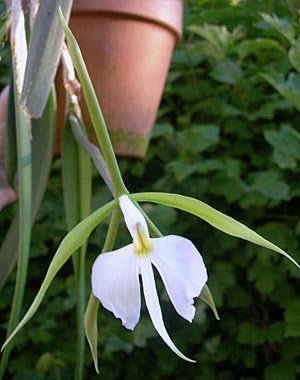
(pronounced eh-pi-DEN-drum )
A wonderfully diverse genus comprising over 1,100 species. They are mostly epiphytes from the Central and South America and the Caribbean. Anyone new to orchids should acquaint themselves with this group for they are some of the easiest tropical orchids to grow so much so that they are frequently referred to as the “Poor Man’s Orchid”.
They can be divided into two types based upon their growth habit. Firstly those that are reed-stemmed which produce clumps of long slender growths of up to 1.5 m in height lacking pseudobulbs. These produce flowering clusters at the apex of their stems in brilliant colours including red, magenta, yellow, purple and pink. They are prolific bloomers. The reed-stem species Epidendrum radicans and Epidendrum secundum have been extensively hybridised to produce plants of more compact growth while retaining their glorious flowering habit. The most famous hybrids derived from these species are the “Ballerina” group which can often be seen for sale in garden centres.
The second Epidendrum form are those which produce pseudobulbs and look like the more “typical” orchids. A species of this type to be sought is “Button Hole Orchid” Epidendrum radiatum which has one of the most fragrant flowers of the orchid family. Another worthy of any beginner’s collection is Epidendrum parkinsonianum which lacks pseudobulbs but has pendent succulent leaves that produce large exotic white flowers that are strongly fragrant of citrus at night.
Temperature
Cool – Intermediate. Night temperatures approximately 12° to 14° C with a daytime rise of about 10° C.
Light
Moderate (bright indirect).
Watering
Plentiful during the summer and reduced in winter.
Feeding
Moderate.
Did you know…
Epidendrum ibaguense has edible leaves that taste of watermelon and can be chewed like bubblegum!
